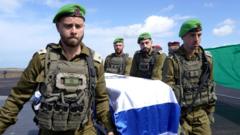The situation between Israel and Hamas continues to evolve as plans for the release of six Israeli hostages are set to take place soon. Despite the anticipation for this exchange, tensions are heightened due to a recent incident involving the misidentification of a body handed over by Hamas. This development poses significant risks to the stability of a fragile cease-fire currently in effect.
Hamas to Release Six More Hostages Amid Tensions Over Misidentification of Remains

Hamas to Release Six More Hostages Amid Tensions Over Misidentification of Remains
Negotiations between Israel and Hamas remain fragile as hostages are expected to be exchanged for Palestinian prisoners despite ongoing tensions.
As Israel and Hamas prepare for a pivotal exchange of hostages and detainees, current negotiations show signs of strain, particularly after the incorrect identification related to the remains of a deceased individual. On Saturday, six Israeli hostages who were abducted during the October 7 attacks in 2023 are set to be freed as part of the ongoing negotiations, where Israel is expected to release over 600 Palestinian prisoners. These talks stem from a cease-fire agreement that commenced in late January.
This latest move comes ahead of the conclusion of the first phase of the cease-fire, which is scheduled to end in early March. Under the terms of the truce, Hamas has been obliged to release approximately 25 Israeli hostages and the remains of eight others in return for over 1,500 Palestinians imprisoned in Israel.
Consequently, the emotional burden on families of hostages is palpable and mixed with relief and sorrow, especially following the mishap surrounding the return of a body initially believed to belong to Shiri Bibas, a symbol of tragedy in Israel, and later confirmed to belong to a different individual. The miscommunication has sparked outrage and frustration among the Israeli public and government officials, raising fears that the forthcoming exchange may lead to renewed conflict should the cease-fire disintegrate.
Further complicating the situation, the Israeli government is under pressure from both the families of hostages and political factions to balance humanitarian concerns with national security. Prime Minister Benjamin Netanyahu is navigating a treacherous political landscape where demands for the full return of hostages conflict with far-right expectations to dismantle Hamas's military capabilities.
As the clock ticks down towards the expected swap, emotions among families of both Israelis and Palestinians run high, with calls for the return of all remaining hostages intensifying. The outcome of negotiations in the coming days will be crucial not only for the surviving hostages but also for the broader context of peace and security in the region.
The upcoming exchange may alleviate some immediate anxieties, but without a commitment for continued negotiations for the second phase of the truce, the situation remains perilously uncertain as both sides grapple with deep-seated grievances that threaten to reignite violence.
This latest move comes ahead of the conclusion of the first phase of the cease-fire, which is scheduled to end in early March. Under the terms of the truce, Hamas has been obliged to release approximately 25 Israeli hostages and the remains of eight others in return for over 1,500 Palestinians imprisoned in Israel.
Consequently, the emotional burden on families of hostages is palpable and mixed with relief and sorrow, especially following the mishap surrounding the return of a body initially believed to belong to Shiri Bibas, a symbol of tragedy in Israel, and later confirmed to belong to a different individual. The miscommunication has sparked outrage and frustration among the Israeli public and government officials, raising fears that the forthcoming exchange may lead to renewed conflict should the cease-fire disintegrate.
Further complicating the situation, the Israeli government is under pressure from both the families of hostages and political factions to balance humanitarian concerns with national security. Prime Minister Benjamin Netanyahu is navigating a treacherous political landscape where demands for the full return of hostages conflict with far-right expectations to dismantle Hamas's military capabilities.
As the clock ticks down towards the expected swap, emotions among families of both Israelis and Palestinians run high, with calls for the return of all remaining hostages intensifying. The outcome of negotiations in the coming days will be crucial not only for the surviving hostages but also for the broader context of peace and security in the region.
The upcoming exchange may alleviate some immediate anxieties, but without a commitment for continued negotiations for the second phase of the truce, the situation remains perilously uncertain as both sides grapple with deep-seated grievances that threaten to reignite violence.




















